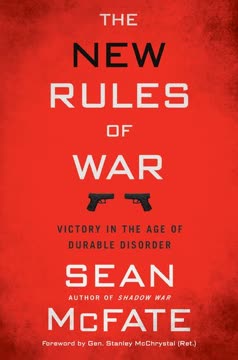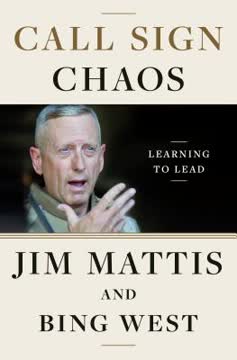Key Takeaways
1. China's Century of Humiliation Fuels its Ambitions
The notion of China’s special position in the hierarchy of nations long predates the rise of the Chinese Communist Party.
Historical Grievances. China's ambition to reclaim its "rightful place" atop the global hierarchy is rooted in a deep-seated sense of grievance stemming from a "century of humiliation" at the hands of Western powers, beginning with the Opium Wars in 1839. This historical narrative, actively encouraged by China's leaders, fuels a desire to avenge past injustices and restore China's former glory.
Darwinian Concepts. Chinese intellectuals embraced Darwinian concepts of competition and survival of the fittest as a means to avenge the humiliation inflicted by the West. This translated into a strategic mindset emphasizing struggle, deception, and the elimination of rivals in the pursuit of national strength.
Confucian Hierarchy. The Chinese worldview, influenced by Confucian ideals, emphasizes hierarchy and the belief that there can only be one ruler at the top. This reinforces the ambition to become the dominant global power, replacing the United States in a new world order.
2. Warring States Period Provides China's Strategic Playbook
The Chinese ying pai hawks do not get lost in their long, complex history; instead, they have sought specific lessons from historical successes and failures that they can use to win the Marathon.
Strategic Lessons. China's leaders draw key lessons from the Spring Autumn and Warring States periods, a time of intense power politics, intrigue, and warfare among rival states. These lessons, often hidden from Western view, inform China's approach to strategy, emphasizing deception, patience, and the manipulation of opponents.
Nine Elements of Chinese Strategy:
- Induce complacency
- Manipulate opponent's advisors
- Be patient
- Steal opponent's technology
- Military might is not critical
- Hegemon will take reckless action
- Never lose sight of shi
- Establish metrics
- Avoid encirclement
The Concept of Shi. At the heart of Chinese strategy is "shi," a difficult-to-translate concept referring to the alignment of forces and the propensity of things to happen. Skilled strategists exploit "shi" to turn events to their advantage, often through deception and manipulation.
3. China Masterfully Manipulated Nixon's Opening
In the case of each American president, Beijing’s strategy seems to have been a product of brilliant improvisation—constant tactical shifts combined with shrewd assessments of the internal differences among the main players in Washington debates.
China's Initiative. The opening of U.S. relations with China in 1971 was not solely an American initiative, but rather a carefully orchestrated move by China to exploit the Sino-Soviet split and gain a new benefactor. Mao Zedong and his advisors skillfully played on American fears of the Soviet Union to extract aid and assistance.
Key Strategies:
- Feigning weakness and dependence
- Offering cooperation against a common rival
- Manipulating perceptions of China's intentions
Larry Wu-Tai Chin. The Chinese benefited from a well-placed spy, Larry Wu-Tai Chin, within the CIA, who provided valuable intelligence on U.S. strategic thinking and planning. This allowed China to anticipate and counter American moves, maximizing its gains from the relationship.
4. China's Message Police Control the Narrative
The comment was remarkable. China’s leaders are extremely careful with their language, especially in public, far more so than Western politicians.
Information Control. China's leaders maintain a sophisticated system to control the narrative about their country, both domestically and internationally. This involves censoring dissenting voices, promoting a carefully crafted image of China, and suppressing information that contradicts their strategic goals.
Key Tactics:
- Rewriting history to portray the U.S. as a long-term adversary
- Suppressing information about human rights abuses and political dissent
- Promoting a positive image of China through state-controlled media and cultural initiatives
Confucius Institutes. The Confucius Institutes, established worldwide, serve as a means to promote Chinese language and culture while subtly shaping perceptions of China and its history. These institutes often avoid sensitive topics and present a sanitized version of Chinese society.
5. China's "Assassin's Mace" Aims to Neutralize US Power
As I assembled clues contradicting the conventional narrative about China that I had always believed, I starting connecting the pieces of an alternative narrative of roughly the past four decades.
Asymmetric Warfare. China is investing heavily in "Assassin's Mace" technologies, asymmetric weapons designed to neutralize the conventional military superiority of the United States. These weapons target vulnerabilities in American systems, such as reliance on satellites and long supply lines.
Key Technologies:
- Anti-satellite weapons
- Cyber warfare capabilities
- Anti-ship ballistic missiles
- Electromagnetic pulse (EMP) weapons
Seven Fears. China's military strategy is driven by a set of "Seven Fears" regarding potential threats from the United States, including blockade, territorial dismemberment, and support for internal rebels. These fears shape China's military planning and its pursuit of asymmetric capabilities.
6. Capitalist Charade: China's State-Controlled Economy Deceives the West
In our hubris, Americans love to believe that the aspiration of every other country is to be just like the United States. In recent years, this has governed our approach to Iraq and Afghanistan. We cling to the same mentality with China.
Mercantilist Strategy. Despite appearances, China's economy is not a free market system, but rather a state-controlled mercantilist model. The government actively supports state-owned enterprises (SOEs), manipulates its currency, and engages in intellectual property theft to gain an unfair advantage in global trade.
State-Owned Enterprises. SOEs, or "national champions," play a crucial role in China's economic strategy, receiving preferential treatment and subsidies from the government. These enterprises are used to acquire foreign technology, secure natural resources, and expand China's global influence.
World Bank's Role. The World Bank, paradoxically, played a key role in shaping China's economic strategy, advising against privatization and promoting a model that preserved state control while integrating market mechanisms. This allowed China to achieve rapid economic growth without fully embracing free market principles.
7. A China-Led World Order: Autocracy, Pollution, and Weaponry
For the past three decades, as a China expert who has worked in the Congress and in the executive branch for every administration since Richard Nixon’s, I have arguably had more access to China’s military and intelligence establishment than any other Westerner.
Authoritarian Values. A China-led world order would likely be characterized by authoritarian values, with less emphasis on individual rights, free speech, and democratic governance. China's support for autocratic regimes around the world would undermine efforts to promote democracy and human rights.
Environmental Degradation. China's rapid economic growth has come at a significant environmental cost, with widespread pollution and resource depletion. A China-led world order could see this model exported to other developing nations, leading to further environmental degradation.
Weapons Proliferation. China's history of selling weapons and missile technology to rogue states raises concerns about the potential for increased proliferation in a China-led world. This could destabilize regions and increase the risk of conflict.
8. America Must Recognize and Counter China's Marathon
We Americans still don’t see China the way it sees us—a condition that has persisted for decades.
Acknowledge the Competition. The first step in countering China's Hundred-Year Marathon is to recognize the nature of the challenge. This involves understanding China's strategic thinking, its long-term goals, and its methods of deception and manipulation.
Develop a Competitiveness Strategy:
- Track all aid to China
- Measure competitiveness
- Develop a competitiveness strategy
- Find common ground at home
- Build a vertical coalition of nations
- Protect political dissidents
- Stand up to anti-American competitive conduct
- Expose corruption and censorship
- Support prodemocracy reformers
Support Reformers. The United States should actively support pro-democracy reformers within China, providing them with resources and platforms to challenge the government's narrative. This involves promoting free speech, human rights, and the rule of law.
Last updated:
FAQ
What is The Hundred-Year Marathon by Michael Pillsbury about?
- China’s secret strategy: The book reveals China’s covert, long-term plan to replace the United States as the global superpower by 2049, the centennial of the Communist Party’s founding.
- Historical and cultural context: Pillsbury explains how ancient Chinese stratagems, especially from the Warring States period, shape China’s modern military, economic, and diplomatic strategies.
- U.S. policy critique: The author argues that decades of American engagement and wishful thinking have underestimated China’s ambitions and inadvertently aided its rise.
Why should I read The Hundred-Year Marathon by Michael Pillsbury?
- Insider’s perspective: Pillsbury draws on decades of experience and access to Chinese military and political elites, offering a rare look into China’s strategic culture.
- Challenges assumptions: The book counters the common belief that China’s rise is peaceful or inevitable, revealing a deliberate, state-driven strategy to surpass the U.S.
- Actionable insights: Pillsbury provides concrete steps and recommendations for U.S. policymakers, scholars, and the public to better understand and respond to China’s challenge.
What are the key takeaways from The Hundred-Year Marathon by Michael Pillsbury?
- China’s patient strategy: China is executing a secret, multi-generational plan to surpass the U.S. by 2049, using deception, strategic patience, and ancient stratagems.
- U.S. misperceptions: American policymakers have repeatedly misunderstood China’s intentions, assuming engagement would lead to cooperation and democracy.
- Asymmetric competition: China invests in “Assassin’s Mace” weapons, propaganda, and economic mercantilism to neutralize U.S. advantages and shape global perceptions.
What is the “Hundred-Year Marathon” concept in The Hundred-Year Marathon by Michael Pillsbury?
- Definition: The “Hundred-Year Marathon” is China’s covert, multi-generational strategy to replace the U.S. as the world’s dominant superpower by 2049.
- Strategic patience: The plan involves decades of economic growth, military modernization, and deception to lull the U.S. into complacency.
- Cultural roots: The strategy is deeply rooted in Chinese historical stratagems, emphasizing concealment, manipulation, and long-term planning.
What are the nine core elements of China’s “Hundred-Year Marathon” strategy according to Michael Pillsbury?
- Inducing complacency: China seeks to lull the U.S. and other rivals into underestimating its ambitions and capabilities.
- Manipulating advisers: Chinese leaders use deception to influence foreign policymakers and shape their perceptions.
- Patience and timing: The strategy emphasizes waiting for the right moment to act, avoiding premature confrontation, and building strength quietly.
- Technology acquisition: Systematic theft and acquisition of technology are central to accelerating China’s rise.
- Non-military focus: Military might is not the sole focus; economic, technological, and informational advantages are prioritized.
How does Michael Pillsbury describe the role of ancient Chinese stratagems in China’s modern strategy?
- Warring States influence: China’s leaders study the Warring States period for lessons in rivalry, deception, and strategic patience.
- Concept of shi: The idea of shi, or the alignment of forces, guides China’s approach to building and exploiting strategic advantage.
- Wei qi analogy: Pillsbury likens China’s strategy to the game of wei qi (Go), where victory comes through encirclement and deception rather than direct confrontation.
What is the significance of the concept of “shi” in Chinese strategic thinking as explained in The Hundred-Year Marathon?
- Strategic configuration: Shi refers to the potential advantage or momentum that can be exploited in a given situation.
- Guides timing and tactics: Understanding shi allows China to build advantages patiently and act at the optimal moment.
- Contrast with Western views: Pillsbury argues that Western policymakers often misunderstand shi, missing the long-term, indirect nature of China’s strategy.
What is the “Assassin’s Mace” (shashoujian) in The Hundred-Year Marathon and why is it important?
- Definition: The “Assassin’s Mace” refers to secret, asymmetric weapons or tactics that allow a weaker power to defeat a stronger adversary.
- Modern application: China is developing antisatellite missiles, cyber warfare capabilities, and other technologies to neutralize U.S. advantages.
- Strategic impact: These weapons are designed to deter or defeat U.S. forces, especially in scenarios like Taiwan, by exploiting American vulnerabilities.
How does Michael Pillsbury explain U.S. policy mistakes toward China in The Hundred-Year Marathon?
- False assumptions: Pillsbury identifies five major false assumptions, including the belief that engagement would lead to cooperation and democracy.
- Ignoring hawkish voices: U.S. policymakers underestimated China’s nationalist hawks and their long-term ambitions.
- Aid and technology transfer: The U.S. inadvertently accelerated China’s rise by providing military technology, intelligence, and economic support.
How does The Hundred-Year Marathon by Michael Pillsbury describe China’s economic strategy and the role of state-owned enterprises (SOEs)?
- Mercantilist approach: China maintains state control over key industries through SOEs, which are heavily subsidized and used to dominate global markets.
- Hybrid model: Chinese SOEs combine state control with market mechanisms, including partial privatization and stock listings, but remain under Party oversight.
- Competitive edge: SOEs serve as national champions, advancing state interests and benefiting from government support, despite inefficiencies and corruption.
How does The Hundred-Year Marathon by Michael Pillsbury explain China’s approach to intellectual property and technology acquisition?
- Systematic theft: China engages in large-scale intellectual property theft, including cyber espionage and forced technology transfers.
- Economic espionage: Pillsbury cites U.S. government reports labeling China as the world’s most active perpetrator of economic espionage.
- Impact on the U.S.: This theft costs the U.S. economy billions annually and threatens American innovation and competitiveness.
What are the best quotes from The Hundred-Year Marathon by Michael Pillsbury and what do they mean?
- “The guest becomes the owner.” — Reflects China’s strategy of quietly entering and eventually taking control, symbolizing its long-term approach to supplanting the U.S.
- “Steal the firewood from under the cauldron.” — Advises undermining an opponent’s power base covertly, relating to China’s economic and strategic tactics.
- “Development is of overriding importance.” — Xi Jinping’s quote signals China’s prioritization of economic growth as the foundation for its global ambitions.
- “Better to see once than to hear a hundred times.” — Emphasizes the importance of recognizing China’s warning signs early rather than dismissing them.
Review Summary
The Hundred-Year Marathon is a controversial book that argues China has a secret strategy to replace the US as global superpower by 2049. Reviews are mixed, with some praising Pillsbury's insights and others criticizing it as alarmist propaganda. Supporters find it eye-opening about China's true intentions, while critics question its factual accuracy and hawkish stance. Many reviewers, regardless of their overall opinion, find the book thought-provoking about US-China relations and China's growing global influence.
Similar Books









Download PDF
Download EPUB
.epub digital book format is ideal for reading ebooks on phones, tablets, and e-readers.




